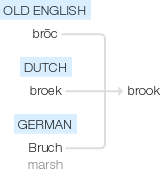Brook
Old English brōc, of unknown origin; related to Dutch broek and German Bruch ‘marsh’.
wiktionary
From Middle English brouken(“to use, enjoy”), from Old English brūcan(“to enjoy, brook, use, possess, partake of, spend”), from Proto-Germanic *brūkaną(“to enjoy, use”), from Proto-Indo-European *bʰruHg-(“to enjoy”). German brauchen is cognate.
From Middle English brook, from Old English brōc(“brook; stream; torrent”), from Proto-West Germanic *brōk(“stream”).
etymonline
brook (n.)
"small natural stream," Old English broc "flowing stream, torrent," of obscure origin, probably from Proto-Germanic *broka- which yielded words in German (Bruch) and Dutch (broek) that have a sense of "marsh, bog." In Sussex and Kent, it means "water-meadow," and in plural, "low, marshy ground."
brook (v.)
"to endure," Old English brucan "to use, enjoy the use of, possess; eat; cohabit with," from Proto-Germanic *brukjanan "to make use of, enjoy" (source also of Old Saxon brukan, Old Frisian bruka "to use, practice," Dutch gebruiken "to use," Old High German bruhhan, German brauchen "to use, need," Gothic brukjan), from PIE root *bhrug- "to enjoy." Sense of "use" as applied to food led to "be able to digest," and by 16c. to "endure, tolerate," always in a negative sense. The original meanings have become obsolete.
